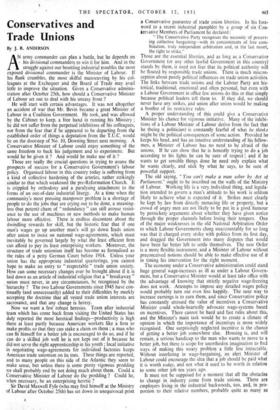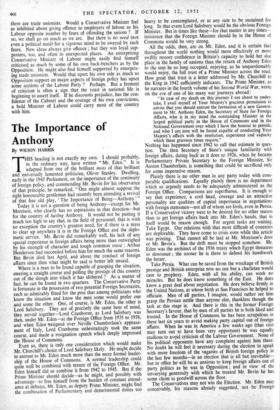Conservatives and Trade Unions
By J. R. ANDERSON
N N army commander can plan a battle, but he depends on • his divisional commanders to win it for him. And in the struggle against our besetting industrial troubles the most exposed divisional commander is the Minister of Labour. If his flank crumbles, the most skilful manoeuvring by his col- leagues at the Exchequer and the Board of Trade may avail little to improve the situation. Given a Conservative adminis- tration after October 25th, how should a Conservative Minister of Labour set out to deal with his uneasy front ? He will Start with certain advantages. It was not altogether an accident of war that Mr. Bevin became a great Minister of Labour in a Coalition Government. He took, and was allowed by the Cabinet to keep, a free hand in running his Ministry ; he did not suffer from the perpetual inhibitions of his colleagues, nor from the fear that if he appeared to be departing from the established order of. things a deputation from the T.U.C. would be on the doorstep of No. 10, Downing Street next morning. A Conservative Minister of Labour could enjoy something of the same freedom to back his judgement and to experiment. But would he be given it ? And would he make use of it ?
Those are really the crucial questions in trying to assess the prospects of success for a Conservative Government's labour policy. Organised labour in this country today is suffering from a kind of collective hardening of the arteries, rather strikingly similar to that which weakened the pre-Reformation Church. It is crippled by orthodoxy and a paralysing attachment to the forms of an out-of-date industrial liturgy. At a time when the community's most pressing manpower problem is a shortage of people to do the jobs that are crying out to be done, a meaning- less (but potent) chant of " redundancy " can still arouse resist- ance to the use of machines or new methods to make human labour more effective. There is endless discontent about the dwindling rewards for skill, but the historic fear that if one man's wages go up another man's - will go down leads union after union to insist on national wage-agreements, which must inevitably be governed largely by what the least efficient firm can afford to pay its least enterprising workers. Moreover, the structure of trade unionism itself has become, as formalised as the rules of a petty German Court before 1914. Unless your union has the appropriate industrial quarterings, you cannot hope to make an entry to " respectable " trade union society. How can some necessary changes ever be brought about if it is laid down as an article of industrial religion that a " breakaway " union must never, in any circumstances, be recognised by the ' hierarchy ? The two Labour Governments since 1945 have con- tinually (and unnecessarily) added to their difficulties by meekly accepting the doctrine that all vested trade union interests are sacrosanct, and that any change is heresy. Now we want a few robust heresies. Team after industrial tram which has come back from visiting the United States has duly reported the most heretical findings—productivity is high there at least partly because American workers like a firm to make profits so that they can stake a claim on them ; a man who can fit himself for a better job is encouraged to do so, and if he can do- a skilled job well he is not kept out of it because he did not serve the right:apprenticeship in his youth ; local initiative in negotiating wage-agreements for individual factories keeps American trade unionism on its toes. These things are reported, and to many people on this side of the Atlantic they seem to make sense, but unless there is some pretty vigorous prodding we shall probably end by not doing much about them. Could a Conservative Minister of Labour do the prodding ? Could he, when necessary, be an enterprising heretic ?
Sir David Maxwell Fyfe (who may find himself at the Ministry of Labour after October 25th) has set down in unequivocal print a Conservative guarantee of trade union liberties. In his fore- word to a recent industrial pamphlet by a group of six Con- iervative Members of Parliament he declared:
" The Conservative Party recognises the necessity of preserv- ing collective bargaining—with its concomitants of free com- bination, truly independent arbitration and, in the last resort, the right to strike."
Those are the essential liberties, and as long as a Conservative Government (or any other lawful Government in this country) stands by them, it need not fear that its political authority will be flouted by responsible trade unions. There is much miscon- ception about purely political influences on trade union activities. The links between trade unions and the Labour Party are his- torical, traditional, emotional and often personal, but even with a Labour Government in office few unions do this or that simply because political leaders tell them to. If they did, we should never have any strikes, and union after union would be making a bonfire of its restrictive rules.
A proper understanding of this could give a Conservative Minister his chance for vigorous initiative. Many of the inhibi- tions of a Labour Minister of Labour derive from the fact that he (being a politician) is constantly fearful of what he thinks might be the political consequences of some action. Provided ho keeps his head, and has an intuitive understanding of his fellow- men, a Minister of Labour has no need to be afraid of the unions. If he can show that he is honestly trying to do a job according to his lights he can be sure of respect; and if he wants to get sensible things done he need only explain what he wants clearly, and stick by what he says, to be sure of powerful support.
The old saying, " You can't make a man sober by -Act oj Parliament," ought to be inscribed on the walls of the Ministry of Labour. Working life is a very. individual thing, and legisla- tion intended to govern a man's attitude to his work is seldom likely to achieve what is expected of it. Strikes must clearly be kept by law from directly menacing life or property, but a crowd of angry men are not likely to be put in a good humour by pernickety arguments about whether they have given notice through the proper channels before losing their tempers. One of the major weaknesses in the old National Arbitration Order to which Labour Governments clung unaccountably for so long was that it charged every strike with politics from its first day, and dragged the Government into many disputes that would have been far better left to settle themselves. The new Order is a more flexible/instrument, and a Minister of Labour without preconceived notions should be able to make effective use of it in timing his intervention for the right moment.
The economy under a Conservative administration could stand huge general wage-increases as ill as under a Labour Govern- ment, but a Conservative Minister would at least take office with the advantage of knowing that strictly negative wage-freezing does not work. Attempts to impose any detailed wages policy , would probably turn out even less happily. The sane way to increase earnings is to earn them, and since Conservative policy has constantly stressed the value of incentives a Conservative Minister could whole-heartedly advocate wage-systems based on incentives. There cannot be hard and fast rules about this, and the Minister's main task would be to create a climate of opinion in which the importance of incentiv,s is more widely recognised. One surprisingly neglected incentive is the chance of getting a better job somewhere else. Housing is, and will remain, a serious handicapto the man who wants to move to a better job, but there is scope for unorthodox imagination to find ways of making this weary problem a little less intractable. Without interfering in wage-bargaining, an alert Minister of Labour could encourage the idea that a job should be paid what it is worth today, and not What it used to be worth in relation to some other job ten years ago. It must not be supposed for a moment that all the obstacles to change in industry come from trade unions. There are employers living in the industrial backwoods, too, and, in pro- portion to their relative numbers, probably quite as many as there are trade unionists. Would a Conservative Minister feel as inhibited about giving offence to employers of labour as his Labour opposite number by fears of offending the unions ? If so, we shall go on much as we are. But there is no need (not even a political need) for a vigorous mind to be swayed by such fears. New ideas always give offence ; but they win loyal sup- porters, too, and often in unexpected places. An enterprising Conservative Minister of Labour might easily find himself criticised as much by some of his own back-benchers as by the Opposition. He might also find himself supported by enterpris- ing trade unionists. Would that upset his own side as much as Opposition support on major aspects of foreign policy has upset some sections of the Labour Party ? Perhaps. But a ferment of criticism is often a sign that the yeast in national life is beginning to assert itself. If he discounts prejudice, has the con- fidence of the Cabinet and the courage of his own convictions, a bold Minister of Labour could carry most of the country with him.



































 Previous page
Previous page